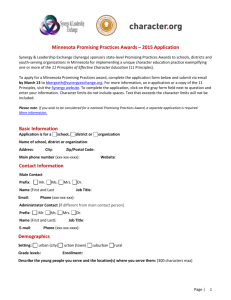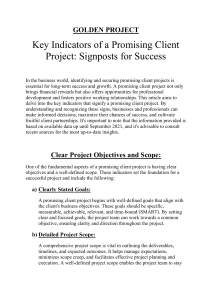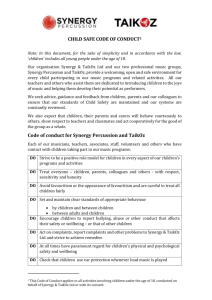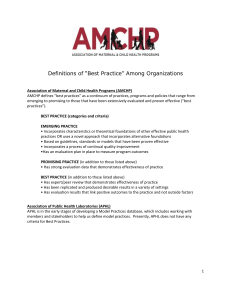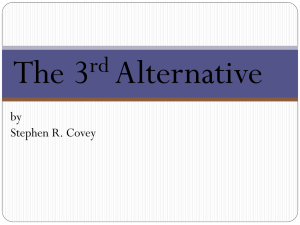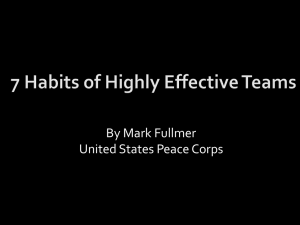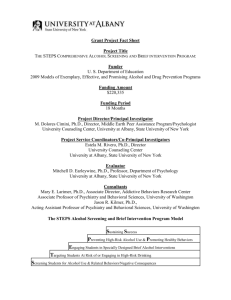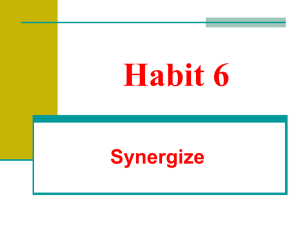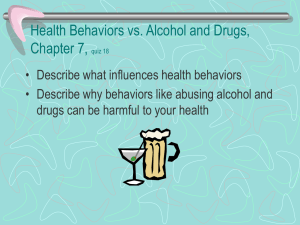Minnesota Promising Practices Awards – 2016 Application
advertisement
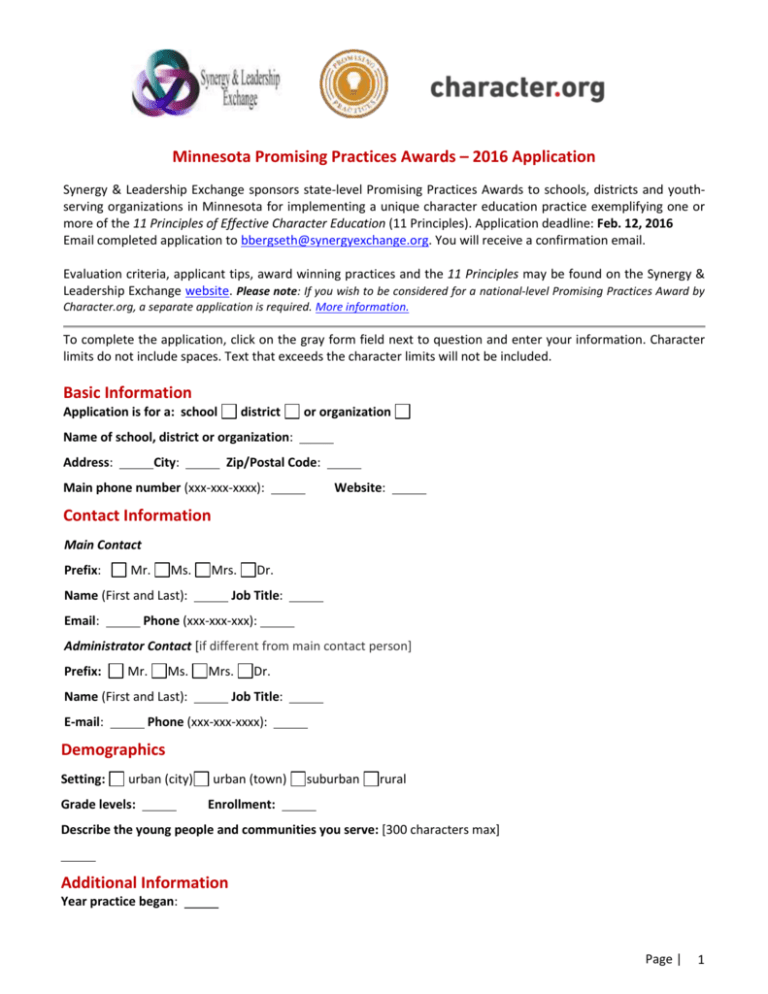
Minnesota Promising Practices Awards – 2016 Application Synergy & Leadership Exchange sponsors state-level Promising Practices Awards to schools, districts and youthserving organizations in Minnesota for implementing a unique character education practice exemplifying one or more of the 11 Principles of Effective Character Education (11 Principles). Application deadline: Feb. 12, 2016 Email completed application to bbergseth@synergyexchange.org. You will receive a confirmation email. Evaluation criteria, applicant tips, award winning practices and the 11 Principles may be found on the Synergy & Leadership Exchange website. Please note: If you wish to be considered for a national-level Promising Practices Award by Character.org, a separate application is required. More information. To complete the application, click on the gray form field next to question and enter your information. Character limits do not include spaces. Text that exceeds the character limits will not be included. Basic Information Application is for a: school district or organization Name of school, district or organization: Address: City: Zip/Postal Code: Main phone number (xxx-xxx-xxxx): Website: Contact Information Main Contact Prefix: Mr. Ms. Mrs. Name (First and Last): Email: Dr. Job Title: Phone (xxx-xxx-xxx): Administrator Contact [if different from main contact person] Prefix: Mr. Ms. Mrs. Name (First and Last): E-mail: Dr. Job Title: Phone (xxx-xxx-xxxx): Demographics Setting: urban (city) Grade levels: urban (town) suburban rural Enrollment: Describe the young people and communities you serve: [300 characters max] Additional Information Year practice began: Page | 1 How did you hear about this program/application? [Check all that apply] Synergy website SOC coordinator Email/mailing Colleague/supervisor Conference Other Check all that apply (to the best of your knowledge) This organization has applied for a Promising Practice before. This organization has received one or more Promising Practices before. Overview This practice implements which of the following 11 Principle(s): [You may check up to 2, but only check the principle your practice most strongly reflects as your application is evaluated based on what you indicate.] PRINCIPLE 1: Promotes core values (Students can identify core values at their level and explain how behaviors exemplify those values.) PRINCIPLE 2: Defines "character" to include thinking, feeling and doing (Students practice behaviors that demonstrate core values in practical settings.) PRINCIPLE 3: Uses a comprehensive approach (Practice enforces school behavior expectations and a sense of school community.) PRINCIPLE 4: Creates a caring community (Results in students feeling bullying, cruelty and/or teasing are extremely rare in their school.) PRINCIPLE 5: Provides students with opportunities for moral action (Students learn civility and personal responsibility while helping others and reflect on the process.) PRINCIPLE 6: Offers a meaningful and challenging academic curriculum (Evidence of achieving at a higher level utilizing critical thinking, logical reasoning and/or problem solving.) PRINCIPLE 7: Fosters students' self-motivation (Addresses intrinsic versus extrinsic motivation.) PRINCIPLE 8: Engages staff as a learning community (Staff demonstrates respectful and supportive behavior, serving as role models for student behavior.) PRINCIPLE 9: Fosters shared leadership (Everyone serves as ‘leaders’ of the character initiative. Staff views the initiative as sustainable.) PRINCIPLE 10: Engages families and community members as partners (Strong two-way communication us evidenced between the school and the parents/community.) PRINCIPLE 11: Assesses the culture and climate of the school (Artifacts demonstrate assessment results and how results were used to improve the character initiative.) This practice fits under the following Topic(s): [Check up to 3] Academics Administrators Assemblies Assessment & Action Behavior Management/Positive Discipline Bullying/Peer Cruelty Prevention Class Meeting /Cooperative Learning Community Members Conflict Resolution/Peer Mediation Differentiation/Performance Character Engaging/Interactive Curriculum Integration into Curriculum Leadership Groups Mentoring Older Students Orientations/Welcoming Parents & Grandparents Relationship Building Service to Community/Service Learning Service to School/ School Beautification Social Issues/Diversity/Tolerance Social Recognition/Sportsmanship Staff Development/Student Leadership Student Autonomy Empowerment Student-led Assessments Teaching/Learning of Core Values Teen Programs/Personal Responsibility Visual Display of Core Values Workshops/Classes/Discussion Group Page | 2 Enter the name of the practice exactly as you wish it to appear: [50 characters max] Enter a one-sentence description of your practice [200 characters max]: Enter a one-paragraph description of your practice [1,200 characters max]: Practice Information Answer each of the questions below. Give unique, separate responses for each. 1. What is the practice and how have you implemented it in your school or district? [1,800 characters max] Provide a detailed and specific description, providing information about the rationale, goals, objectives, preparation and training, number of people involved and frequency of the practice. 2. How does the specific practice contribute to character development? [1,200 characters max] Explain how the practice helps students develop good character and any activities that allow for feedback and reflection from students and staff. 3. What effect is the practice having on students in your school, district or organization? [1,200 characters max] Provide evidence that students have acquired positive skills, attitudes or behaviors as a result of this practice. Explain how you know you have met the goals and objectives of your practice. Include any data, survey results or testimonials that support the practice’s effectiveness. Page | 3
